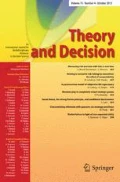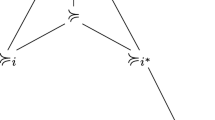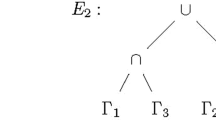Abstract
In this paper, we are concerned with the preorderings (SS) and (BC) induced in the set of players of a simple game by the Shapley–Shubik and the Banzhaf–Coleman's indices, respectively. Our main result is a generalization of Tomiyama's 1987 result on ordinal power equivalence in simple games; more precisely, we obtain a characterization of the simple games for which the (SS) and the (BC) preorderings coincide with the desirability preordering (T), a concept introduced by Isbell (1958), and recently reconsidered by Taylor (1995): this happens if and only if the game is swap robust, a concept introduced by Taylor and Zwicker (1993). Since any weighted majority game is swap robust, our result is therefore a generalization of Tomiyama's. Other results obtained in this paper say that the desirability relation keeps itself in all the veto-holder extensions of any simple game, and so does the (SS) preordering in all the veto-holder extensions of any swap robust simple game.
Similar content being viewed by others
REFERENCES
Allingham, M.G. (1975), Economic power and values of games, Zeitschrift für Nationalökonomie 35, 293–299.
Banzhaf, J.F. (1965), Weighted voting doesn't work: a mathematical analysis, Rutgers Law Review 19, 317–343.
Diffo Lambo, L. and Moulen, J. (2001), Quel pouvoir mesure-t-on dans un jeu de vote? Mathématiques et Sciences Humaines 152, 27–47.
Moulen, J. and Diffo Lambo, L. (2001), Théorie du vote Hermes Science Publications, Paris.
Felsenthal, D.S. and Machover, M. (1995), Postulates and paradoxes of relative voting power – a critical re-appraisal, Theory and Decision 38, 195–229.
Isbell, J.R., (1975), A class of simple games, Duke Mathematical Journal 25, 423–439.
Moulen, J. (1997), Comparaison de notions de pouvoir dans un jeu de vote. Documents du CREUSET, Université de Saint-Etienne, Juillet 1997.
Shapley, L.S. and Shubik, M. (1954), A model for evaluating the distribution of power in a committee system, Amer. Poli. Science Review 48, 787–792.
Taylor, A. and Zwicker, W. (1993), Weighted voting, multicameral representation, and power, Games and Economic Behavior 5, 170–181.
Taylor, A.D. (1995), Mathematics and Politics. Springer, Berlin.
Taylor, A.D. and Zwicker, W.S. (1999), Simple Games. Princeton University Press, Princeton, NJ.
Tomiyama, Y. (1987), Simple Game, Voting Representation and Ordinal Power Equivalence, Int. Jour. on Policy and Information 11(1), 67–75.
Author information
Authors and Affiliations
Rights and permissions
About this article
Cite this article
Diffo Lambo, L., Moulen, J. Ordinal equivalence of power notions in voting games. Theory and Decision 53, 313–325 (2002). https://doi.org/10.1023/A:1024158301610
Issue Date:
DOI: https://doi.org/10.1023/A:1024158301610




